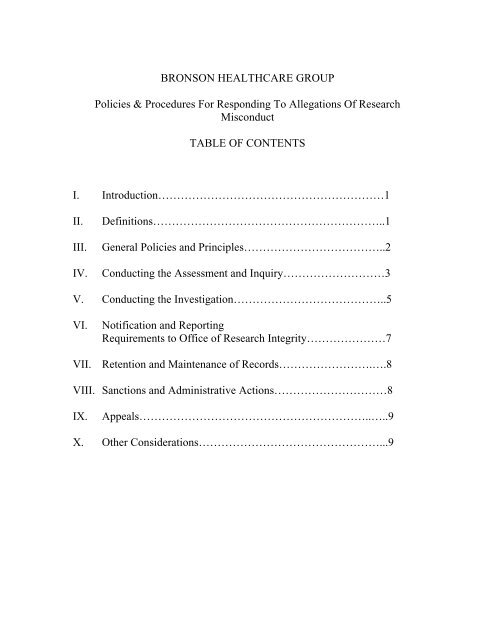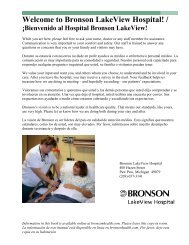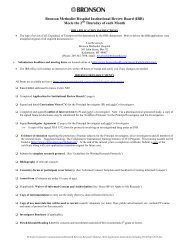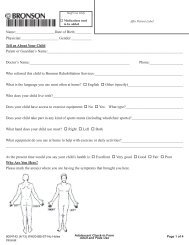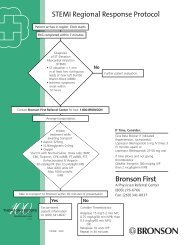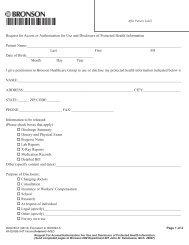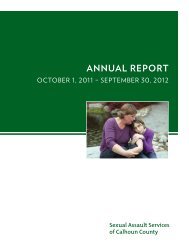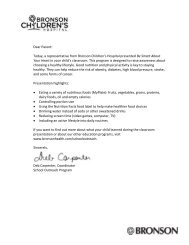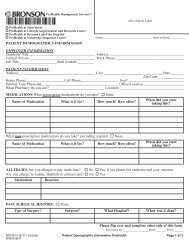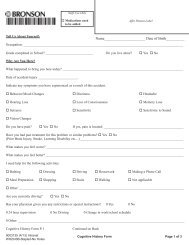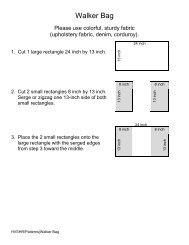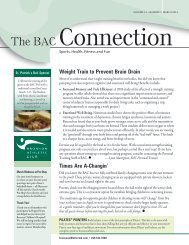IRB Responding to Allegation of Research Misconduct Policy
IRB Responding to Allegation of Research Misconduct Policy
IRB Responding to Allegation of Research Misconduct Policy
Create successful ePaper yourself
Turn your PDF publications into a flip-book with our unique Google optimized e-Paper software.
BRONSON HEALTHCARE GROUP<br />
Policies & Procedures For <strong>Responding</strong> To <strong>Allegation</strong>s Of <strong>Research</strong><br />
<strong>Misconduct</strong><br />
TABLE OF CONTENTS<br />
I. Introduction……………………………………………………1<br />
II.<br />
III.<br />
IV.<br />
Definitions……………………………………………………..1<br />
General Policies and Principles………………………………..2<br />
Conducting the Assessment and Inquiry………………………3<br />
V. Conducting the Investigation…………………………………..5<br />
VI.<br />
Notification and Reporting<br />
Requirements <strong>to</strong> Office <strong>of</strong> <strong>Research</strong> Integrity…………………7<br />
VII. Retention and Maintenance <strong>of</strong> Records…………………….….8<br />
VIII. Sanctions and Administrative Actions…………………………8<br />
IX.<br />
Appeals……………………………………………………..…..9<br />
X. Other Considerations…………………………………………...9
Policies and Procedures for <strong>Responding</strong> <strong>to</strong> <strong>Allegation</strong>s <strong>of</strong> <strong>Research</strong><br />
<strong>Misconduct</strong><br />
I. Introduction<br />
Purpose<br />
This policy outlines the process at Bronson Methodist Hospital, or any Bronson<br />
Healthcare Group affiliate (“Institution”) <strong>to</strong> respond <strong>to</strong>, investigate, and report any<br />
allegations <strong>of</strong> research misconduct.<br />
Scope<br />
This statement <strong>of</strong> policies and procedures applies <strong>to</strong> allegations <strong>of</strong> research<br />
misconduct involving a person who, at the time <strong>of</strong> the alleged research misconduct,<br />
was employed by, was an agent <strong>of</strong>, or was affiliated by contract or agreement with<br />
this Institution.<br />
A finding <strong>of</strong> research misconduct requires that:<br />
• There be a significant departure from accepted practices <strong>of</strong> the relevant<br />
research community, and<br />
• The misconduct be committed intentionally, knowingly, or recklessly, and<br />
• The allegation be proven by a preponderance <strong>of</strong> the evidence. 1<br />
This statement <strong>of</strong> policy and procedure was written <strong>to</strong> comply with the Public Health<br />
Service (PHS) <strong>Policy</strong> on research <strong>Misconduct</strong>, 42 CFR § 93, and the Federal <strong>Policy</strong><br />
on research misconduct issued by the Office <strong>of</strong> <strong>Research</strong> Integrity (ORI). The<br />
policies and procedures apply except when specifically excluded. All exclusions<br />
relate <strong>to</strong> requirements for reporting <strong>to</strong> the Office <strong>of</strong> <strong>Research</strong> Integrity. Such<br />
reporting requirements are limited <strong>to</strong> research sponsored by the U.S. Public Health<br />
Service.<br />
This statement <strong>of</strong> policy and procedure does not apply <strong>to</strong> authorship or collaboration<br />
disputes and applies only <strong>to</strong> allegations <strong>of</strong> research misconduct that occurred within<br />
six years <strong>of</strong> the date the Institution or HHS received the allegation, subject <strong>to</strong> the<br />
subsequent use, health or safety <strong>of</strong> the public, and grandfather exceptions in 42 CFR §<br />
93.105(b).<br />
Responsibility<br />
The Senior VP <strong>of</strong> Legal and Legislative Affairs, Corporate Compliance Officer, will<br />
serve as the Institutional Official who has the primary responsibility for<br />
implementation <strong>of</strong> the Institution’s policies and procedures on research misconduct.<br />
1
II. Definitions<br />
<strong>Research</strong> <strong>Misconduct</strong>: means fabrication, falsification, or plagiarism in proposing,<br />
performing, or reviewing research, or in reporting research results. Fabrication is<br />
making up data or results and recording or reporting them. Falsification is<br />
manipulating research materials, equipment, or processes, or changing or omitting<br />
data or results such that the research is not accurately represented in the research<br />
record. Plagiarism is the appropriation <strong>of</strong> another person’s ideas, processes, results,<br />
or words without giving appropriate credit. <strong>Research</strong> misconduct does not include<br />
honest error or differences <strong>of</strong> opinion. 2<br />
Respondent: means the person against whom an allegation <strong>of</strong> research misconduct is<br />
directed or who is the subject <strong>of</strong> a research conduct proceeding. 3<br />
Complainant: means a person who in good faith makes an allegation. 4<br />
<strong>Allegation</strong>: means a disclosure <strong>of</strong> possible research misconduct through any means <strong>of</strong><br />
communication. The disclosure may be by written or oral statement or other<br />
communication <strong>to</strong> an Institutional or HHS <strong>of</strong>ficial. 5<br />
III. General Policies and Principles<br />
Responsibility <strong>to</strong> Report <strong>Misconduct</strong><br />
All Institutional members will report observed, suspected, or apparent research<br />
misconduct. If an individual is unsure whether a suspected incident falls within the<br />
definition <strong>of</strong> research misconduct, he or she may meet with or contact the RIO <strong>to</strong><br />
discuss the suspected research misconduct informally, which may include discussing<br />
it anonymously and/or hypothetically. If the circumstances described by the<br />
individual do not meet the definition <strong>of</strong> research misconduct, the RIO will refer the<br />
individual or allegation <strong>to</strong> other <strong>of</strong>ficials with responsibility for resolving the<br />
problem.<br />
Cooperation with <strong>Research</strong> <strong>Misconduct</strong> Proceedings<br />
Institutional members will cooperate with Institutional <strong>of</strong>ficials in the review <strong>of</strong><br />
allegations and the conduct <strong>of</strong> inquiries and investigations. Institutional members,<br />
including respondents, have an obligation <strong>to</strong> provide evidence <strong>to</strong> research misconduct<br />
allegations <strong>to</strong> the Institution.<br />
The Institution will cooperate fully and on a continuing basis with ORI during its<br />
oversight reviews <strong>of</strong> this Institution and its research misconduct proceedings and<br />
during the process under which the respondent may contest ORI findings <strong>of</strong> research<br />
misconduct and proposed HHS administrative actions. This includes providing, as<br />
necessary <strong>to</strong> develop a complete record <strong>of</strong> relevant evidence, all witnesses, research<br />
records, and other evidence under the Institution’s control or cus<strong>to</strong>dy, or in the<br />
possession <strong>of</strong>, or accessible <strong>to</strong>, all persons that are subject <strong>to</strong> the Institution’s<br />
authority.<br />
2
The Institution will cooperate with and assist ORI and HHS, as needed, <strong>to</strong> carry out<br />
administrative actions HHS may impose as a result <strong>of</strong> a final finding <strong>of</strong> research<br />
misconduct by HHS.<br />
Confidentiality<br />
To the extent allowed by law, the identity <strong>of</strong> respondents and complainants will be<br />
maintained securely and confidentially and will not be disclosed except <strong>to</strong>: (1) those<br />
who need <strong>to</strong> know in order <strong>to</strong> carry out a through, competent, objective and fair<br />
research misconduct proceeding; and (2) ORI as it conducts its review <strong>of</strong> the research<br />
misconduct proceeding and any subsequent proceedings.<br />
To the extent allowed by law, any information obtained during the research<br />
misconduct proceeding that might identify the subjects <strong>of</strong> research will be maintained<br />
securely and confidentially and will not be disclosed, except <strong>to</strong> those who need <strong>to</strong><br />
know in order <strong>to</strong> carry out the research misconduct proceeding.<br />
Ensuring a Fair <strong>Research</strong> <strong>Misconduct</strong> Proceeding<br />
The Institution will take all reasonable steps <strong>to</strong> ensure an impartial and unbiased<br />
misconduct proceeding <strong>to</strong> the maximum extent practicable, including participation <strong>of</strong><br />
persons with appropriate scientific expertise who do not have unresolved personal,<br />
pr<strong>of</strong>essional, or financial conflicts <strong>of</strong> interest with those involved with the inquiry or<br />
investigation. 6<br />
Protecting Complainants, Witnesses, and Committee Members<br />
Institutional members may not retaliate in any way against complainants, witnesses,<br />
or committee members. Institutional members should immediately report any alleged<br />
or apparent retaliation against complainants, witnesses or committee members <strong>to</strong> the<br />
Institution, who shall review the matter and, as necessary, make all reasonable and<br />
practical efforts <strong>to</strong> counter any potential or actual retaliation and protect and res<strong>to</strong>re<br />
the position and reputation <strong>of</strong> the person against whom the retaliation is directed.<br />
Protecting the Respondent<br />
As requested and as appropriate, the Institution will make all reasonable and practical<br />
efforts <strong>to</strong> protect or res<strong>to</strong>re the reputation <strong>of</strong> persons alleged <strong>to</strong> have engaged in<br />
research misconduct, but against whom no finding <strong>of</strong> research misconduct is made. 7<br />
Interim Administrative Actions and Notifying ORI <strong>of</strong> Special Circumstances<br />
Throughout the research misconduct proceeding, the Institution will review the<br />
situation <strong>to</strong> determine if there is any threat <strong>of</strong> harm <strong>to</strong> public health, federal funds and<br />
equipment, or the integrity <strong>of</strong> the PHS supported research process. In the event <strong>of</strong><br />
such a threat, the Institution will, in consultation with other Institutional <strong>of</strong>ficials and<br />
ORI, take appropriate action <strong>to</strong> protect against any such threat. 8 3
IV. Conducting the Assessment and Inquiry<br />
Assessment <strong>of</strong> <strong>Allegation</strong>s<br />
Upon receiving an allegation <strong>of</strong> research misconduct, the Institution will immediately<br />
assess the allegation <strong>to</strong> determine if: (1) it meets the definition <strong>of</strong> research misconduct in;<br />
(2) it involves PHS supported research (in jurisdictional criteria <strong>of</strong> 42 CFR § 93.102(b));<br />
(3) it is sufficiently credible and specific so that potential evidence <strong>of</strong> research<br />
misconduct may be identified.<br />
Initiation and Purpose <strong>of</strong> Inquiry<br />
If the Institution determines that the criteria for an inquiry are met, he/she will<br />
immediately initiate the inquiry process. The purpose <strong>of</strong> the inquiry is <strong>to</strong> conduct an<br />
initial review <strong>of</strong> the available evidence <strong>to</strong> determine whether <strong>to</strong> conduct an investigation.<br />
An inquiry does not require full review <strong>of</strong> all the evidence related <strong>to</strong> the allegation. 9<br />
Notice <strong>to</strong> Respondent & Sequestration <strong>of</strong> <strong>Research</strong> Records<br />
At the time <strong>of</strong> or before beginning an inquiry, the Institution must make a good faith<br />
effort <strong>to</strong> notify the respondent in writing, if the respondent is known. If the inquiry<br />
subsequently identifies additional respondents, they must be notified in writing. On or<br />
before the date on which the respondent is notified, or the inquiry begins, whichever is<br />
earlier, the Institution must take all reasonable and practical steps <strong>to</strong> obtain cus<strong>to</strong>dy <strong>of</strong> all<br />
the research records and evidence needed <strong>to</strong> conduct the research misconduct proceeding,<br />
inven<strong>to</strong>ry records and evidence and sequester them in a secure manner, except that where<br />
the research records or evidence encompass scientific instruments shared by a number <strong>of</strong><br />
users, cus<strong>to</strong>dy may be limited <strong>to</strong> copies <strong>of</strong> the data or evidence on such instruments, so<br />
long as those copies are substantially equivalent <strong>to</strong> the evidentiary value <strong>of</strong> the<br />
instruments. 10 (42 CFR § 93.305, 93.307(b)<br />
Inquiry Process<br />
The inquiry process includes reviewing the evidence, preparing the inquiry report,<br />
determining if an investigation is warranted and providing the respondent a reasonable<br />
opportunity <strong>to</strong> comment on the inquiry report. The process will normally involve<br />
interviewing the complainant, the respondent, and key witnesses as well as examining<br />
relevant research records and materials.<br />
Time for Completion<br />
The inquiry, including preparation <strong>of</strong> the final inquiry report and the decision on whether<br />
an investigation is warranted, will be completed within 60 calendar days on initiation <strong>of</strong><br />
the inquiry, unless the Institution determines that circumstances clearly warrant a longer<br />
period.<br />
Inquiry Report<br />
The inquiry report will contain the following information:<br />
• The name and position <strong>of</strong> the respondent;<br />
• Description <strong>of</strong> the allegations <strong>of</strong> research misconduct;<br />
4
• The PHS support, including for example, grant numbers, grant applications,<br />
contracts and publications listing PHS support;<br />
• The basis for recommending or not recommending that the allegations warrant an<br />
investigation;<br />
• Any comments on the report by the respondent or the complainant. 11<br />
• If the inquiry takes longer than 60 days <strong>to</strong> complete, the inquiry record must<br />
include documentation <strong>of</strong> the reasons for exceeding the 60-day period. 12<br />
Institutional Decision<br />
The Institution will determine whether an investigation is necessary, whether the matter<br />
should be dropped, or whether some other appropriate action is indicated.<br />
Notification <strong>to</strong> Respondent and Opportunity <strong>to</strong> Comment<br />
The Institution will notify the respondent whether the inquiry found an investigation <strong>to</strong> be<br />
warranted, include a copy <strong>of</strong> the draft inquiry for comment and include a copy <strong>of</strong> the<br />
Institution’s policies and procedures on research misconduct (and refer <strong>to</strong> 42 CFR Part 93<br />
if applicable <strong>to</strong> PHS-funded research). 13<br />
The Institution may notify the complainant who made the allegation whether the inquiry<br />
found that an investigation is warranted. The Institution may provide relevant portions <strong>of</strong><br />
the report <strong>to</strong> the complainant for comment.<br />
V. Conducting the Investigation<br />
Initiation and Purpose<br />
The investigation will begin within 30 days after determining that an investigation is<br />
warranted. 14 The purpose <strong>of</strong> the investigation is <strong>to</strong> develop a factual record by exploring<br />
the allegations in detail and examining the evidence in depth, leading <strong>to</strong> recommended<br />
findings on whether research misconduct has been committed, by whom, and <strong>to</strong> what<br />
extent. The investigation will also determine whether there are additional instances <strong>of</strong><br />
possible research misconduct that would justify broadening the scope beyond the initial<br />
allegations.<br />
Notifying Respondent & Sequestration <strong>of</strong> <strong>Research</strong> records<br />
On or before the date on which the investigation begins, the Institution will notify the<br />
respondent in writing <strong>of</strong> the allegations <strong>to</strong> be investigated. The Institution will also give<br />
the respondent written notice <strong>of</strong> any new allegations <strong>of</strong> research misconduct within a<br />
reasonable amount <strong>of</strong> time <strong>of</strong> deciding <strong>to</strong> pursue allegations not addressed during the<br />
inquiry or in the initial notice <strong>of</strong> the investigation. 15<br />
The Institution will, prior <strong>to</strong> notifying the respondent <strong>of</strong> the allegations, take all<br />
reasonable and practice steps <strong>to</strong> obtain cus<strong>to</strong>dy <strong>of</strong> and sequester in a secure manner all<br />
research records and evidence needed <strong>to</strong> conduct the research misconduct proceeding that<br />
were not previously sequestered during the inquiry. The procedures <strong>to</strong> be followed for<br />
sequestration during the investigation are the same procedures that apply during the<br />
inquiry. 16 5
Investigation Process<br />
The Institution will:<br />
• Use diligent efforts <strong>to</strong> ensure that the investigation is through and sufficiently<br />
documented and includes examination <strong>of</strong> all research records and evidence<br />
relevant <strong>to</strong> reaching a decision on the merits <strong>of</strong> each allegation. 17<br />
• Interview each respondent, complainant, and any other available person who has<br />
been reasonably identified as having information regarding any relevant aspects<br />
<strong>of</strong> the investigation, including witnesses identified by the respondent, and record<br />
or transcribe each interview, provide the recording or transcript <strong>to</strong> the<br />
interviewee for correction, and include the recording or transcript in the record <strong>of</strong><br />
the investigation: and 18<br />
• Pursue diligently all significant issues and leads discovered that are determined<br />
relevant <strong>to</strong> the investigation, including any evidence <strong>of</strong> any additional instances<br />
<strong>of</strong> possible research misconduct, and continue the investigation <strong>to</strong> completion. 19<br />
Time for Completion<br />
The investigation is <strong>to</strong> be completed within 120 days <strong>of</strong> beginning it, including<br />
conducting the investigation, preparing the report <strong>of</strong> findings, providing the draft report<br />
for comment and if applicable sending the final report <strong>to</strong> ORI. 20<br />
Investigation Report<br />
The Institution will prepare a written draft report <strong>of</strong> the investigation that:<br />
• Describes the nature <strong>of</strong> the allegation <strong>of</strong> research misconduct, including the<br />
identification <strong>of</strong> the respondent;<br />
• Describes and documents the PHS support, including for example, the numbers <strong>of</strong><br />
any grants that are involved, grant application, contracts and publications listing<br />
PHS support (if applicable);<br />
• Describes the specific allegations <strong>of</strong> research misconduct considered in the<br />
investigation;<br />
• Includes the Institutional policies and procedures under which the investigation<br />
was conducted, unless those policies and procedures were provided <strong>to</strong> ORI<br />
previously;<br />
• Identifies and summarizes the research records and evidence reviewed and<br />
identifies any evidence taken in<strong>to</strong> cus<strong>to</strong>dy but not reviewed; and<br />
• Includes a statement <strong>of</strong> findings for each allegation <strong>of</strong> research misconduct<br />
identified during the investigation. Each statement <strong>of</strong> findings will:<br />
- Identify whether the research misconduct was falsification, fabrication, or<br />
plagiarism, and whether it was committed intentionally, knowingly, or<br />
recklessly;<br />
- Summarize the facts and the analysis that support the conclusion and<br />
consider the merits <strong>of</strong> any reasonable explanation by the respondent,<br />
including any effort by respondent <strong>to</strong> establish by a preponderance <strong>of</strong> the<br />
evidence that he or she did not engage in research misconduct because <strong>of</strong><br />
honest error or a difference <strong>of</strong> opinion;<br />
- Identify the specific PHS support (if applicable);<br />
6
- Identify whether any publications need correction or retraction;<br />
- Identify the person(s) responsible for the misconduct; and<br />
- List any current support or known applications or proposals for support<br />
that the respondent has pending with non-PHS federal agencies. 21<br />
Comments on the Draft Report and Access <strong>to</strong> Evidence<br />
The Institution will give the respondent a copy <strong>of</strong> the draft investigation report for<br />
comment and, concurrently, a copy <strong>of</strong>, or supervised access <strong>to</strong> the evidence on which the<br />
report is based. The respondent will be allowed 30 days from the date he/she received<br />
the draft report <strong>to</strong> submit comments <strong>to</strong> the Institution. The respondent’s comments will<br />
be included and considered in the final report. 22<br />
Decision<br />
When a final decision on the case has been reached, the Institution will notify the<br />
respondent and complainant in writing. After informing the ORI (when applicable), the<br />
Institution will determine whether law enforcement agencies, pr<strong>of</strong>essional societies,<br />
pr<strong>of</strong>essional licensing boards, edi<strong>to</strong>rs <strong>of</strong> journals in which falsified reports may have been<br />
published, collabora<strong>to</strong>rs <strong>of</strong> the respondent in the work, or other relevant parities should<br />
be notified <strong>of</strong> the outcome <strong>of</strong> the case. The Institution is responsible for ensuring<br />
compliance with all notification requirements <strong>of</strong> funding or sponsoring agencies.<br />
VI. Notification and Reporting Requirements <strong>to</strong> Office <strong>of</strong> <strong>Research</strong> Integrity<br />
applicable <strong>to</strong> PHS-funded research only)<br />
Within 30 days <strong>of</strong> the decision that an investigation is warranted and no later than the<br />
date in which the investigation begins, the Institution will provide ORI with the<br />
Institution’s written decision and a copy <strong>of</strong> inquiry report. 23<br />
The Institution will provide the following information <strong>to</strong> ORI upon request:<br />
• The Institutional policies and procedures under which the inquiry was conducted;<br />
• The research records and evidence reviewed, transcripts or recordings <strong>of</strong> any<br />
interviews, and copies <strong>of</strong> all relevant documents; and<br />
• The charges for the investigation <strong>to</strong> consider<br />
If the Institution determines that the investigation will not be completed within the 120-<br />
day period, he/she will submit <strong>to</strong> ORI a written request for an extension, setting forth the<br />
reasons for the delay. The Institution will ensure that periodic progress reports are filed<br />
with ORI, if ORI grants the request for an extension and directs the filing <strong>of</strong> such<br />
reports. 24<br />
Unless an extension has been granted, the Institution must within 120-day period for<br />
completing the investigation submit the following <strong>to</strong> ORI:<br />
• A copy <strong>of</strong> the final investigation report with all attachments<br />
• A statement <strong>of</strong> whether the Institution accepts the findings <strong>of</strong> the investigation<br />
report<br />
• A statement <strong>of</strong> whether the Institution found misconduct and if so, who<br />
committed the misconduct; and<br />
7
• A description <strong>of</strong> any pending or completed administrative actions against the<br />
respondent. 25<br />
The Institution is also responsible for providing any information, documentation, research<br />
records, evidence or clarification requested by the ORI <strong>to</strong> carry out its review <strong>of</strong> an<br />
allegation <strong>of</strong> research misconduct or <strong>of</strong> the Institution’s handling <strong>of</strong> such an allegation. 26<br />
If an investigation is <strong>to</strong> be terminated for any reason without completing all relevant<br />
federal requirements, the Institution will submit a report <strong>of</strong> the planned termination <strong>to</strong><br />
ORI and include the reasons for the termination. ORI will then decide whether further<br />
investigations should be undertaken.<br />
The Institution will report <strong>to</strong> ORI any proposed settlements, admissions <strong>of</strong> research<br />
misconduct, or Institutional findings <strong>of</strong> misconduct that arise at any stage <strong>of</strong> a misconduct<br />
proceeding, including the allegation and inquiry stages.<br />
The Institution will keep ORI apprised <strong>of</strong> any developments during the course <strong>of</strong> the<br />
investigation that may affect current or potential DHHS funding for the individual(s)<br />
under investigation.<br />
At any time during a research misconduct proceeding, the Institution will notify ORI<br />
immediately if there is reason <strong>to</strong> believe that any <strong>of</strong> the following conditions exist:<br />
• Health or safety <strong>of</strong> the public is at risk, including an immediate need <strong>to</strong> protect<br />
human or animal subjects.<br />
• HHS resources or interests are threatened.<br />
• <strong>Research</strong> activities should be suspended.<br />
• There is reasonable indication <strong>of</strong> violations <strong>of</strong> civil or criminal law.<br />
• Federal action is required <strong>to</strong> protect the interests <strong>of</strong> those involved in the research<br />
misconduct proceeding.<br />
• The Institution believes that the research misconduct proceeding may be made<br />
public prematurely, so that HHS may take appropriate steps <strong>to</strong> safeguard evidence<br />
and protect the rights <strong>of</strong> those involved.<br />
• The research community or public should be informed. 27<br />
VII. Retention and Maintenance <strong>of</strong> Records<br />
The Institution will maintain and provide <strong>to</strong> ORI upon request “records <strong>of</strong> research<br />
misconduct proceedings” as defined in 42 CFR 93.317. Unless cus<strong>to</strong>dy has been<br />
transferred <strong>to</strong> HHS or ORI has advised in writing that the records no longer need <strong>to</strong> be<br />
retained, records <strong>of</strong> research misconduct proceedings must be maintained in a secure<br />
manner for 7 years after completion <strong>of</strong> the proceeding or the completion <strong>of</strong> any PHS<br />
proceeding involving the research misconduct allegation. 28<br />
VIII. Sanctions and Administrative Actions<br />
If the Institution determines that research misconduct is substantiated by the findings,<br />
appropriate actions will be taken. The administrative actions may include:<br />
8
• Withdrawal or correction <strong>of</strong> all pending or published abstracts and papers<br />
emanating from the research where research misconduct was found;<br />
• Removal <strong>of</strong> the responsible person from the particular project, letter <strong>of</strong> reprimand,<br />
special moni<strong>to</strong>ring <strong>of</strong> future work, probation, suspension, salary reduction, or<br />
initiation <strong>of</strong> steps leading <strong>to</strong> possible rank reduction or termination <strong>of</strong><br />
employment;<br />
• Restitution <strong>of</strong> funds <strong>to</strong> the gran<strong>to</strong>r agency as appropriate; and<br />
• Other action appropriate <strong>to</strong> the research misconduct.<br />
IX. Appeals<br />
The Institution may provide for an appeal by the respondent that could result in a reversal<br />
or modification <strong>of</strong> the Institution’s findings <strong>of</strong> research misconduct. The appeal will be<br />
completed within 120 days <strong>of</strong> its filing, unless ORI finds good cause for an extension,<br />
based upon the Institution’s written request for an extension that explains the need for the<br />
extension. If ORI grants an extension, it may direct the filing <strong>of</strong> periodic progress<br />
reports. 29<br />
X. Other Considerations<br />
Termination or Resignation Prior <strong>to</strong> Completing Inquiry or Investigation<br />
The termination <strong>of</strong> the respondent’s Institutional employment, by resignation or<br />
otherwise, before or after an allegation <strong>of</strong> possible research misconduct has been<br />
reported, will not preclude or terminate the research misconduct proceeding or other wise<br />
limit any <strong>of</strong> the Institution’s responsibilities.<br />
If the respondent, without admitting <strong>to</strong> the misconduct, elects <strong>to</strong> resign his or her position<br />
after the Institution receives an allegation <strong>of</strong> research misconduct, the assessment <strong>of</strong> the<br />
allegation will proceed, as well as the inquiry and investigation, as appropriate based on<br />
the outcome <strong>of</strong> the preceding steps. If the respondent refuses <strong>to</strong> participate in the process<br />
after resignation, the Institution and any inquiry or investigation committee will use their<br />
best efforts <strong>to</strong> reach a conclusion concerning the allegations, noting in the report the<br />
respondent’s failure <strong>to</strong> cooperate and its effect on the evidence.<br />
Res<strong>to</strong>ration <strong>of</strong> the Respondent’s Reputation<br />
Following a final finding <strong>of</strong> no research misconduct, including ORI concurrence where<br />
required by 42 CFR Part 93, the Institution must, at the request <strong>of</strong> the respondent,<br />
undertake all reasonable and practical efforts <strong>to</strong> res<strong>to</strong>re the respondent’s reputation. 30<br />
Protection <strong>of</strong> the Complainant, Witnesses, and Committee Members<br />
During the research misconduct proceeding and upon its completion, regardless <strong>of</strong><br />
whether the Institution or ORI determines that research misconduct occurred, the<br />
Institution must undertake all reasonable and practical efforts <strong>to</strong> protect the position and<br />
reputation <strong>of</strong>, or <strong>to</strong> counter potential or actual retaliation against, any complainant who<br />
made allegations <strong>of</strong> research misconduct in good faith and <strong>of</strong> any witness and persons<br />
who cooperate in good faith with the research misconduct proceeding. 31 9
<strong>Allegation</strong>s Not Made in Good Faith<br />
If relevant, the Institution will determine whether the complainant’s allegations <strong>of</strong><br />
research misconduct were made in good faith. If the Institution determines that there was<br />
an absence <strong>of</strong> good faith he/she will determine whether any administrative action should<br />
be taken against the person who failed <strong>to</strong> act in good faith.<br />
1 42 CFR § 93.104<br />
2 42 CFR §93.103<br />
3 42 CFR§ 93.225<br />
4 42 CFR § 93.203<br />
5 42 CFR § 93.302<br />
6 42 CFR 93.300(b), 93.310(f)<br />
7 42 CFR 93.304(k)<br />
8 42 CFR 93.304(h)<br />
9 42 CFR 93.307(c)<br />
10 42 CFR 93.305, 93.307(b)<br />
11 42 CFR 93.309<br />
12 42 CFR 93.307(g)<br />
13 42 CFR 93.308(a)<br />
14 42 CFR 93.310(a)<br />
15 42 CFR 93.310(b)(c)<br />
16 42 CFR 93.310(d)<br />
17 42 CFR 93.310(d)<br />
18 42 CFR 93.310(g)<br />
19 42 CFR 93.310(h)<br />
20 42 CFR 93.311(a)<br />
21 42 CFR 93.313<br />
22 42 CFR 93.312(a), 93.313(g)<br />
23 42 CFR 93.310(b)<br />
24 42 CFR 93.311<br />
25 42 CFR 93.315<br />
26 42 CFR 93.300(g), 93.304(b)(d)<br />
27 42 CFR 93.318<br />
28 42 CFR 93.317(b)<br />
29 42 CFR 93.314<br />
30 42 CFR 93.304(k)<br />
31 42 CFR 93.304(i)<br />
10


